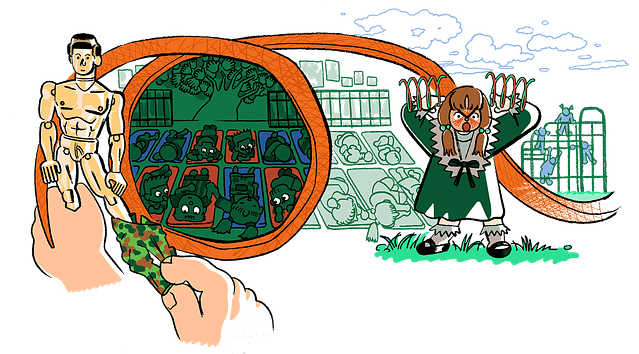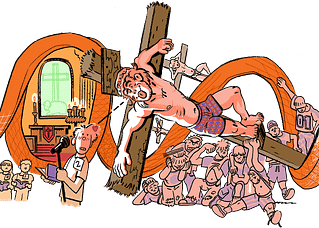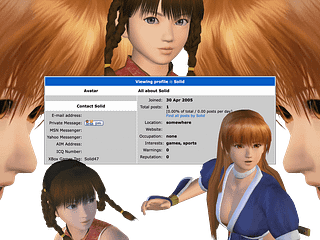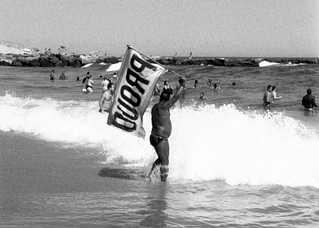
In his column “Show Me Your Hole,” Paul McAdory searches for his determinative wound.
From an early age I existed. I still do and suspect I will until I don’t. The end doesn’t trouble me, nor the beginning. It’s the span in between: What to make of that?
After my birth, time started to pass. At three I took note. Returning post-birthday to the Baptist McMegachurch where I attended preschool in Clinton, Mississippi, I wore new blue jeans and knew that they were new and that two was behind me. I had crossed a boundary; I had ascended to the mountaintop; I had done something and that meant something, and the second something had to do with a change in who I was and how I would be going forward. Teachers and parents and siblings had called me a big boy, had told me that soon I would be yet bigger, that the world would expect more of me, that my footspeed would increase, my hands expand, my teeth fall out and come in, my strength double and triple, my capabilities generally mushroom, and now here I was, older and aware of the fact and changed by my awareness. Change rang gong-like through the air. Looking up at the cubby tops I glimpsed a present and recognized that it was for me, that it commemorated my safe passage from one year to another. Inside I discovered a tall GI Joe whose clothes came off. I had a penis, and the boy who gave it to me had a penis — we had crossed streams in the bathroom — but Joe was unburdened. The gift intrigued me less than its giver.
God loved me, family loved me, and my friends loved me in their way, but romantic love remained elusive. Before I could find it, I needed to grow further. I needed not to shit or wet myself since neither is attractive. I needed to master the cleanup song and caretaking generally. Partners have their demands. Spelling — there was a challenge worth meeting and one I met. Sitting on my mother’s lap one evening, I toyed with letters as with Legos, hoping to build from the twenty-six available shapes a structure recognizable to her and my sisters, to impress them, and stringing b, o, and y together, I accomplished my task, received their adulation, and squirmed with joy at my luck, which perhaps represented more than luck — worthiness, promise.
A year and another passed. I never worried that it wouldn’t happen and then it happened: love stood over me on the church playground, where I now spent the hours after kindergarten let out. Her name was Stephanie and she had chased me until I fell. I was familiar with this courtship model, having spent the most memorable stretches of my third year (i.e., age two) on the run from The Biter, a boy with a serious appetite for flesh, primarily mine, which led my parents to pull me out of one preschool-daycare and, fatefully, enroll me where I’d later trip in the dirt before Stephanie. She wanted to know, would I be her boyfriend? This is what one does with life: find a partner, smooch, settle down, reproduce, toss a dish or two in anger, threaten to call a lawyer, say that you’re leaving, scream that you’re leaving, leave but only briefly, return, apologize, resent, forget, wish that you had left forever and then feel glad you didn’t, continue the project of life, march toward its finish when you have the energy and sit awaiting the same when you don’t. So yes, I said.
At home that evening I bragged to my cats and snake and all present relations: I have a girlfriend. They seemed proud or happy at my pride. Just look at him, their looks said. On the school’s lawn I squashed red wasps and black-and-yellow bees undersneaker but took breaks to attend to Stephanie. We kissed because couples kiss, quarreled because couples quarrel, gamboled because children gambol.
A photograph survives. It shows us napping on adjacent mats, her wavy brown tresses next to my strawberry blonde bowl, her hand folded safely in mine or vice versa if you prefer. We appear content, but sleeping bodies lie. Mostly I wasn’t content at naptime. Mostly I fought sleep. The same had been true at preschool where I once, after a rare surrender to weariness, awoke to a tight fist of shit in my pantaloons. I had penguined to my cubby, retrieved the Ziploc in which my mother packed a change of clothes for me, and penguined toward the bathroom. There I disrobed and let fall some feces in the process. Elsewhere on the floor I spilled out the contents of the bag. My extra pair of socks and the soiled clothing I removed soaked up the assorted tile and body smears. I dressed and emerged less full of shit but freshly aware of my ass’s capacity for treachery. Whether my instructor didn’t notice or merely pretended not to notice my state hardly mattered. I had avoided humiliation before my classmates but not before myself. My perceptions of my bodily education, the very fact of straightforward, untroubled advancement through life’s stages: were these realities or wishes? I redoubled my efforts at unbroken consciousness.
Thus it was that at Clinton Park Elementary I sat coolly awake during the mandated, post-recess naptime and wondered at the use of the unending hour. Blue light beat in through the shaded windows. Mrs. B., the teacher and picture taker, worked quietly at papers on her desk. Bodies lay curled around tables and chairs while their owners fled elsewhere. Why did they dream now, at the height of the day, when the monkey bars’ memory might be most vividly recollected and its meanings cemented? I couldn’t fathom it. I could fathom that I was bored and that the nearest thing to a cure for boredom was to let my gaze wander, to fidget and peer out at my surroundings, to turn my head subtly left and right so as to take in every ounce of available visual data. Scan the room, learn its crannies and the contours of sleeping classmates. If I persevered, I might find — what? I didn’t know except that when I found it, I wouldn’t be able to look away.
It wasn’t one thing but two: eyes. Another child’s met mine. I won’t pretend to remember their color so let’s say brown since brown’s probable. One day I caught his brown eyes and in the process found or founded a select, decentralized cabal of boys of which I became not only a member but perhaps unwitting ringleader. Our group had exactly one purpose: to expose ourselves to one another. We did not speak about our purpose; we did not try, verbally or mentally, to understand it. We simply pursued it. We pulled down the front of our pants until the mass flopped out. And we pursued it until the teacher, lifting her head to check on her charges, saw my lowered pants, or just a child groping near his crotch, and whispered a question. Did I need to go to the bathroom? Boredom had faded, fascination succeeded it. Now a shadow of censure prevailed over the scene.
Stephanie was my beloved first girlfriend, though unfortunately for women [hysterical laughter] not my last. We dated off and on from kindergarten to first grade — wild years [sparser laughter] — and yet I never told her. I could never muster the courage necessary to say, “Stephanie, look, look at me, I love you, look at me, I love you but I run a ring, it is loose and consists of boys and we flash each other nearly daily,” or a more composed equivalent. For various reasons.
I wonder now if Stephanie knew anyway. I wonder if she could tell — probably she could, let’s say — that behind her back, in the very same room and during the very same nap period during which on some days we would slumber hand in hand, I was exposing myself to C. and G. and who-remembers-who, that they in turn were, from red-and-blue nap mats every bit the color and shape and size of the red-and-blue nap mats Stephanie and I pushed together and retired side-by-side upon, exposing themselves to me. I wonder if she knew that I relished those moments with my gentleman friends at least as much as I relished pecking her atop the playground’s wind-swayed clover, and I wonder if she knew that her ignorance was essential somehow to the thrill of my middle-of-the-nap indiscretions.
She and I kissed on the cheek and we kissed on the mouth and I was a proud boy and it was a cursed love. It couldn’t live. It couldn’t last. We kissed until Mrs. B. asked us to stop and then kept kissing. We were five and then we were six and Mrs. B. was a consummate spoilsport. I regret it now; it rips at me. Not our love, not our kissing, not ever that, never, but rather what I hid from her: my dishonor and malfeasance, my mad need for what she could never (not ever) provide me, my great sin and so on and so forth. And that it ended.
When she broke up with me the first time, in kindergarten, she communicated her revelation through a complex series of hand signals paired with words: you (index fingers pointing at my face) drive (hands turning an oversized steering wheel) me (thumbs to her chest) crazy (pointers twirling at her temples, head undulating). I got the message. She was crazy. I was the cause. Little did she know that I was crazy, too, unhinged by her failure to fulfill me. Or did she know, deep down? And is that why, really, she stopped things then? I cannot answer. I know that we got back together — we tried again and fizzled. Half of all relationships, etc. And I know that very often they do know, these apparently straight, gay-dating girls. But we will always have the clover that we trod upon in the pine-scented breeze and — that we were.
Draw a circle. Step into it. Describe what you see; describe what you don’t; invent what you want or must. This is one approach to memory. Isolate an incident and elaborate its contents. Thomas Bernhard wrote in a memoir that “to write about a period of one’s life, no matter how remote or how recent, no matter how long or how short, means accumulating hundreds and thousands and millions of falsehoods and falsifications, all of which are familiar to the writer describing the period as truths and nothing but truths.” I’d like to think that, had he lived long enough to witness the heyday of the memoir and personal essay, and then had he lived past it into the present, Bernhard would have loved this one, given that I wrote it and that I’ve limited myself to a few falsehoods, unintentionally made and of which of I am basically unaware, blinded as I am by the swinging kliegs of meaning and love, both of which I aim to stop, to have hover over me for a moment together so that I might light up in the incandescence they throw from way up in the zone of electrified transcendence. But I try not to flatter myself; one should be delusional only to a helpful and healthful extent.
In the search for meaning and love, which ladens life with meaning, I look especially for their afterimage, for the wound left by their recession. I am looking for the hole in my life out of which all my disaffection and malfunction emanate, as well the compensatory potentiality and strengths they imply. This hole is a logo, trademark pending. From the pattern of its creases, its size, its age, its particular elasticity, and the contents of its discharge, one can discern my brand identity, and through its refinement and dissemination and dutiful application to my personage my value may grow. Going back as far as I can, to the first glimmerings of my confused duplicity, to the vision of a child discontinuing her relationship with another child, I look for my opening. I seek it in the path of love or faux-love, for the heart is like a hole. Things swell inside it, bloat and burst. We fill it for a while to feel it empty out.


